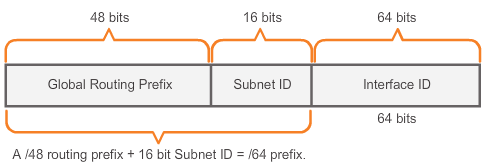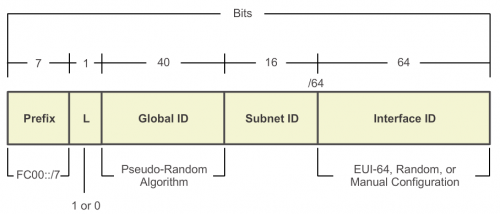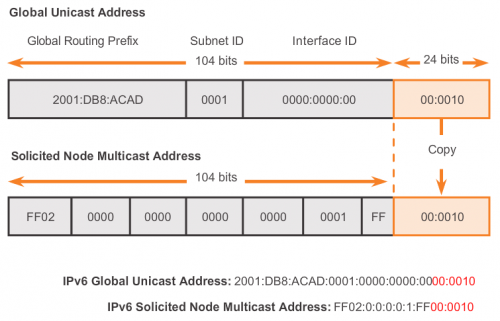IPv6 network addresses
There are three types of IPv6 addresses:
- Unicast - An IPv6 unicast address uniquely identifies an interface on an IPv6-enabled device.
- Multicast - An IPv6 multicast address is used to send a single IPv6 packet to multiple destinations.
- Anycast - An IPv6 anycast address is any IPv6 unicast address that can be assigned to multiple devices. A packet sent to an anycast address is routed to the nearest device having that address.
IPv6 does not have a broadcast address. However, there is an IPv6 all-nodes multicast address that essentially gives the same result.
Unicast IPv6 addresses
- Global unicast - similar to a public IPv4 address, globally unique, Internet routable addresses. It can be configured statically or assigned dynamically. The current range is 2000::/3. The address consists of 3 parts:
- Global routing prefix - network portion of the address that is assigned by the provider, such as an ISP, to a customer or site, currently /48 global prefix is used by ISPs
- Subnet ID - used by an organization to identify subnets within its site
- Interface ID - equivalent to the host portion of an IPv4 addres. The term Interface ID is used because a single host may have multiple interfaces, each having one or more IPv6 addresses.
16 32 48 64 80 96 112 128 bit count
| | | | | | | |
2001:0db8:ac10:fe01:0000:0000:0000:0001/64 HEX
\ \
0010.0000.0000.0001 (...) 0000.0000.0000.0001 binary
- Link-local - Link-local addresses are used to communicate with other devices on the same local link. With IPv6, the term link refers to a subnet. Link-local addresses are confined to a single link. Their uniqueness must only be confirmed on that link because they are not routable beyond the link therefore all router interfaces can can be configured with the same link-local address for easier the router identification. In other words, routers will not forward packets with a link-local source or destination address. They are from FE80::/10 range FE80 - FEBF and also used by IPv6 routing protocols to exchange messages and as the next-hop address in the IPv6 routing table. When DHCPv6 or SLAAC (Stateless Address Autoconfiguration) is used, the link-local address will automatically be specified as the default gateway address.
- Loopback - represented as ::1/128 or just ::1 in the compressed format
- Unspecified address - ::/128 or just :: in the compressed format. It cannot be assigned to an interface and is only be used as a source address. It is used as a source address when the device does not yet have a permanent IPv6 address or when the source of the packet is irrelevant to the destination.
- Unique local address ULA RFC 4193 - similarity to RFC 1918 private addresses for IPv4, Unique local addresses are used for local addressing within a site or between a limited number of sites. These addresses should not be routable in the global IPv6. Unique local addresses have prefix FC00::/7, which results in a first hextet range of FC00 to FDFF. The next 8th bit is set to 1 if the prefix is locally assigned.
- IPv4 embedded - used to help transition from IPv4 to IPv6
Special purpose ranges
- 2001:0DB8::/32 - reserved for documentation purposes
Basic IPv6 router configuration
Router(config-if)#ipv6 address 2001:dc9:bdbc:1::1/64 ! configure interface with ipv6 address/prefix Router(config)#ipv6 unicast-routing ! enables ipv6 routing Router#show ipv6 interface brief Router#show ipv6 route
Multicast IPv6 addresses
Multicast addresses have the prefix FF00::/8 and can be only be a destination address never a source address.
Assigned Multicast address
That include reserved predefined groups of devices split into two ranges:
- FF02::1 All-nodes multicast group - multicast group that all IPv6-enabled devices join, a packet sent to this group has the same effect as a broadcast address in IPv4.
- FF02::2 All-routers multicast group - multicast group that all IPv6 routers join when configured with
ipv6 unicast-routingcommand.
Solicited-node multicast address
Unlikely All-nodes multicast this is more truly multicast group address. A packet sent to this nodes will be process only by devices that have these same 24 bits in the least significant, portion of their Interface ID.
The solicited-node multicast address consists of two parts:
- FF02:0:0:0:0:1:FF00::/104 multicast prefix – the first 104 bits of the all solicited-node multicast address
Least significant 24-bits – the last 24 bits of the solicited-node multicast address. These bits are copied from the far right 24 bits of the global unicast or link-local unicast address of the device.
IPv6 quick reference address ranges
First Hextet (Far Left) - Type of IPv6 Address
- 0000 to 00FF - Loopback address, any address, unspecified address, or IPv4-compatible
- 2000 to 3FFF - Global unicast address (a routable address in a range of addresses that is currently being handed out by the Internet Assigned Numbers Authority [IANA])
- FE80 to FEBF - Link-local (a unicast address which identifies the host computer on the local network)
- FC00 to FCFF - Unique-local (a unicast address which can be assigned to a host to identify it as being part of a specific subnet on the local network)
- FF00 to FFFF - Multicast address
Windows XP ipv6
Install ipv6 stack
ipv6 install
Configure interface with ipv6 address, interface name "Local Area Connection"
netsh interface ipv6 set address "Local Area Connection" 2001:db8:acad:1::3
Verify
ipconfig
Static IPv6 route configuration
Configure default static IPv6 route
ipv6 route ::/0 {next hop ipv6-address | interface-type interface-number}
Configure IPv6 static route. The next hop address can be either an IPv6 global or link-local address.
ipv6 route ipv6-prefix/prefix-length {next hop ipv6-address|interface-type interface-number}
ipv6 route 2001:0DB8:ACAD:1::/64 2001:0DB8:ACAD:3::1
ipv6 route 2001:0DB8:ACAD:2::/64 s0/0/1
References
- Internet Protocol Version 6 Address Space IANA.org
- RFC 6724 - Default Address Selection for IPv6 rules




